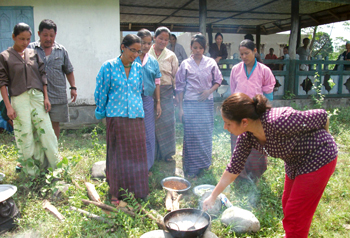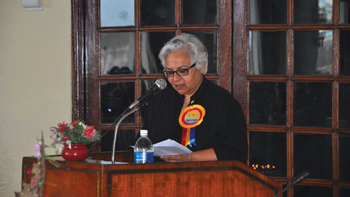Through its wide ranging exchange programs, FK Norway is letting young people in the global north and south learn more about one another
When Norwegians Kristin Andresen and Gunvald Hagen first arrived in Kathmandu last year on a FK Norway program, they just knew one thing about Nepal: the Himalayas. “We were excited to be accepted into the program and getting the opportunity to work in a foreign country, but had little idea of Nepal,” admits Andresen.
Like Andresen and Hagen, around 200 young Norwegians travel to countries in Asia, Africa, and Latin America every year through the state-sponsored Fredskorpset Norway program started in 1963. Initially modeled after the American Peace Corps, FK Norway adopted a more inclusive approach in 2000 and a started mutual programs between partner companies in Norway and the global south. Since then almost 6,000 volunteers have been a part of this international exchange.

GOING GLOBAL (l-r):
Biraj Gautam of PEEDA spent 10 months in India in 2011 as part of FK Norway's south-south program. Gautam worked at Tara Technology and Action for Rural Advancement and is seen here conducting a survery in Uttar Pradesh.
“Abandoning the traditional donor-recipient model has revitalised the entire program. Both partners now feel they are contributing equally and is a great motivation for participants,” says Nita Kapoor, director of FK Norway who was in Nepal last week to celebrate the institution’s 50th anniversary. “Usually one thinks of only countries in the south receiving development assistance, but the relationship really works both ways.”
For the past year and a half, Andresen and Gunvald have been working at the Nepal Music Centre in Battisputali. “Nepal has become a second home for us,” says Hagen who teaches keyboard at the centre while his girlfriend helps in day-to-day administration. Initially, the couple were in Nepal on a 12 month assignment, but requested to extend their term by six months because they enjoyed working here so much. The music centre, a partner of University of Agder in Norway, has three of its employees currently working there.

Hemanta Basnet also from PEEDA did a year long exchange in Bhutan. She worked at Tarayana Foundation teaching local women about cooking and nutrition.
FK Norway also runs a south-south program which sends volunteers and young professionals from one developing country to another. People, Energy, and Environment Development Association (PEEDA), a Nepali organisation which promotes renewable energy, is a part of this exchange and has hosted two Bhutanese and an Indian participant so far. Biraj Gautam of PEEDA spent 10 months in India in 2011 and says the stint helped improve his confidence. “My co-workers tell me I came back a more confident and efficient person,” he admits.
With over 300 local companies participating, Nepal is currently the largest partner for FK Norway. The country has hosted more than 100 volunteers and sent about 150 Nepalis across the globe in the past 12 years. While these organisations are involved in diverse fields ranging from bio-diversity to agriculture, civil society, human rights, health, media, arts and culture, FK Norway wants to shift its focus to sustainable energy. Part of the reason the institute chose Nepal to celebrate its anniversary is so that it can begin searching for potential partners in this field.

Director Nita Kapoor was in Kathmandu recently to commemorate FK Norway's 50th anniversary.
“International volunteers only have positive things to say about Nepal. Most fall in love with the people, culture, and warm hospitality,” explains Kapoor. When asked how Nepalis contribute to the program, she says: “The ability to be innovative and produce results even with minimal resources is a quality we most admire about our Nepali participants.”
Scheduled to return home at the end of August, Andresen and Hagen are looking to make the most out of their last two months in Nepal. Andresen’s remarkable rendition of the Nepali national anthem on her saxophone during Norwegian Day celebrations in May left the audience in complete awe and showed how quickly she has assimilated into her new culture. The duo will also release an album with their Nepali friends in July (see box). Says Andresen: “The people we met and worked with, the music, the culture, and the experiences we gathered will live on even after we leave. We will carry a piece of Nepal with us for the rest of our lives.”
www.fredskorpset.no/en
Kristin Andresen, Norwegian musician, performs Nepali National anthem
The Blue Elephants
No they are not an exotic species of elephants, just a regular jazz band with a somewhat peculiar name: Oh No! Blue elephant with no hat or straw is flying in air. The group was born last year when saxophonist Kristin Andresen and pianist Gunvald Hagen, two FK Norway volunteers, met Nepali musicians - Riju Tuladhar, Nikhil Tuladhar, and Sunit Kansakar - at the Nepal Music Centre. “We were blown away by their talent and hard work and wanted to collaborate with them,” says Hagen.
While the band plays mostly jazz music, it’s the mix of western and Nepali instruments with Riju on bass, Sunit on guitar and sitar, and Nikhil on drums that make them unique. Familiar faces in Kathmandu’s music circuit, the Blue Elephants will be out with their first album later in July.